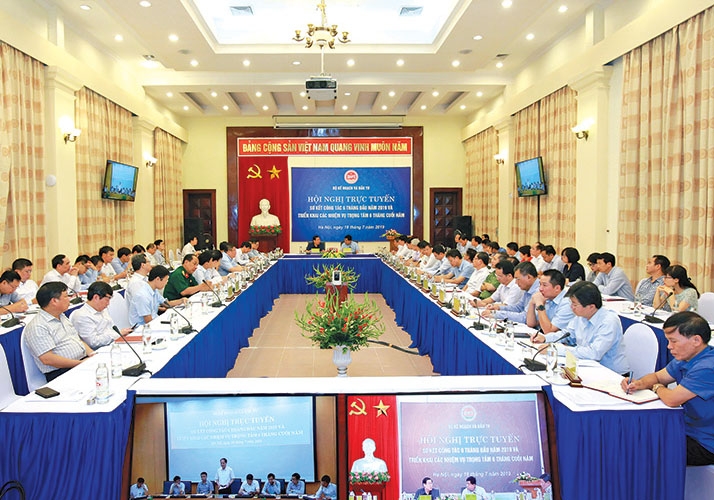Business environment policy tops MPI agenda
 |
| The Ministry of Planning and Investment discussed work plans with governmental agencies and local authorities |
At last week’s teleconference chaired by the Ministry of Planning and Investment (MPI) with government agencies and municipal and provincial authorities to review and set tasks to meet the full-year goals, these issues once again appeared on the agenda.
According to Nguyen Doan Toan, Deputy Chairman of Hanoi People’s Committee, the city is facing several problems related to provisions of major laws clashing with one another and the allocation of official development assistance (ODA), among others.
“The MPI should issue guidelines for provincial- and municipal-level planning, conditions for budget allocation, and financial settlements for various kinds of development planning to enable localities to draw up their future planning,” Toan said. “The MPI should also soon complete the amendment of the Law on Investment (LoI) 2014, the Law on Enterprises (LoE) 2014, and the Law on Public Procurement to facilitate future implementation.”
The city proposed the MPI to report to the government on solutions to the lack of ODA funding allocated to projects. In 2019, ODA allocation in the city has been lower than the capital demand. For example, the city’s Nhon-Hanoi railway station project received VND739.4 billion ($32.15 million) worth of ODA, while it needs around VND1.395 trillion ($60.65 million).
Other cities and provinces, including Haiphong, Danang, and Dong Nai are facing similar problems and have been urged by businesses to issue a solution as soon as possible.
Heavy tasks ahead
These concerns have been plaguing not only localities but also businesses and investors for a long time. To solve the concerns, the MPI will closely work with relevant ministries, agencies, and localities to draft decrees for the implementation of the Law on Public Investment 2019, which has been approved by the National Assembly (NA) and will take effect from January 1, 2020.
There are two major issues hampering implementation of the Law on Planning: provinces and cities’ inability to develop sectoral and provincial planning without national-level planning; and reconciling the criteria, standards, and guidelines of relevant ministries and agencies after the planning of product development is removed.
“The solutions to these issues have been submitted to the government before submitting them for the approval of the eighth session of the NA Standing Committee in October 2019,” said MPI Minister Nguyen Chi Dung.
Regarding inconsistent and overlapping laws on public procurement, land, and housing, the minister said that the MPI is fast-tracking amendments to the LoI and the LoE in order to solve the issue.
On the heels of the successful building of the Law on Public Investment, the MPI is now fast-tracking completion of the important and widely-influential draft Law on Public-Private Partnership and the draft law on amendments to the LoI and the LoE, expecting to leverage more domestic private and foreign investment.
Amid the impact of Industry 4.0 and global complications, the MPI is also working on the National Strategy for the Fourth Industrial Revolution as well as a draft resolution on unprecedented incentive policies at the National Innovation Centre.
With a number of solutions ahead, businesses expect to see fresh developments in the months to come and are pinning high hopes on the further improvement of the business climate as well as higher performance across sectors, thus enabling the country to achieve a GDP growth of 6.6-6.8 per cent this year.
Deputy Prime Minister Vuong Dinh Hue told the conference that along with Vietnam, the rest of the world is expected to see many difficulties in the second half of the year. “Thus, it is necessary to keep the government’s direction in 2019, especially boosting internal motivation and effectively deploying the solutions prescribed in resolutions on bettering the domestic business environment and national competitiveness, as well as in Directive No.09/CT-TTg issued on April 1 on solutions to solve difficulties and ensure the growth target in 2019.”
| Nguyen Chi Dung - Minister of Planning and Investment
The planning and investment authority as well as the Ministry of Planning and Investment (MPI) has tried its best to provide helpful advice to the government. There were difficult duties, but we have all placed efforts to complete the important tasks. Other ministries, sectors, and localities have done a good job in supporting us. Thanks to this support, we have gained important results in the first six months of the year. In the current climate, with the mingling of opportunities and challenges, we will be more active to ensure the progress of high-quality work and stronger innovation, and to build an institution with policies that answer the demand of socio-economic development. In the next six months, there are still many things to do in order to carry out the government’s resolutions. Specifically, the ministry will pay attention to improving the investment climate to attract high-quality projects, thus ensuring sustainable development. Huynh Quang Hai - Deputy Minister of Finance
In the first six months of 2019, our economy continued to experience stable development. The MPI completed a huge amount of work, including building new institutions and laws, implementing tasks under resolutions, and developing programmes on socio-economic development. Over the last six months, the MPI and the Ministry of Finance have actively co-operated, ensuring the development of the economy, the stability of the macro economy, and the control of inflation. In the next six months, the two ministries need to continue co-operation. There are law documents that need the agreement of the two ministries on investment, enterprises, tax, stocks, and public investment. I hope that the two sides will co-operate to create synchronisation, and provide solutions for the shortcomings of the current laws. Furthermore, in the last six months of the year, the two ministries will also need to co-operate to seek out issues needing institutionalisation, because in the first six months of 2020, the MPI will consider investment allocation for the next five years. If it is impossible to shape and define the institution, then it is impossible to give out criteria for allocation of budgets. Tran Van Tung - Deputy Minister of Science and Technology
Over the last six months, the Ministry of Science and Technology (MoST) has been very co-operative with the MPI. The MPI has greatly supported the MoST to strengthen the use of technology through projects in localities around Vietnam. For instance, the Vinasat system and the irradiation centre were implemented in the central city of Danang to help with the exporting of fruit. Also, we have developed a startup ecosystem throughout the whole country. The MoST will continue implementing activities to boost startups, including looking for innovative ideas to develop. Each year, the MoST holds National Innovation Day, which is a chance to collect creative ideas from all over the country. Last year, with the support of the MoST, an innovative idea from Vietnam won the highest award in an America innovation competition. In the last six months of 2019, the MoST will concentrate on the task of investing and developing the science and technology sector, with guidance from the MPI. We are also building the plan for 2020 and the mid-term plan for 2021–2025, which works in accordance with the strategies of the Party, the state, and the National Assembly, so that science and technology can continue to promote socio-economic progress. |
Highlights of the first half
“Looking back at the first six months of 2019, the planning and investment authority has performed well, significantly contributing to the nation’s socio-economic development, affirming its pioneering role in reform in legislation and consultancy,” Minister Dung said. “In the second half, we will continue the work with more new reforms.”
Ending the first half of the year, Vietnam achieved impressive milestones in socio-economic development. In particular, the country continued to enjoy sustained and inclusive GDP growth at an estimated 6.76 per cent even as 70 per cent of global economies reported slower growth, while successfully stabilising other macro-economic indexes, with the June consumer price index (CPI) dropping 0.09 per cent on-month, thus resulting in an on-year increase of 2.64 per cent in January-June CPI.
During the period, the MPI worked closely with relevant agencies and local authorities on the drafting and completion of a decree to guide the implementation of the Law on Planning. The MPI also advised the government to promulgate Resolution No.02/NQ-CP dated January 1, 2019 to provide solutions to improve the business environment and national competitiveness towards 2021.
Together with Resolution No.01/NQ-CP also dated January 1 on the main tasks and solutions to implement the socio-economic development plan and state budget estimates for 2019, Resolution 02 has a wide influence on business and investment activities, greatly contributing to the country’s socio-economic development.
What the stars mean:
★ Poor ★ ★ Promising ★★★ Good ★★★★ Very good ★★★★★ Exceptional
Related Contents
Latest News
More News
- NAB Innovation Centre underscores Vietnam’s appeal for tech investment (January 30, 2026 | 11:16)
- Vietnam moves towards market-based fuel management with E10 rollout (January 30, 2026 | 11:10)
- Vietnam startup funding enters a period of capital reset (January 30, 2026 | 11:06)
- Vietnam strengthens public debt management with World Bank and IMF (January 30, 2026 | 11:00)
- PM inspects APEC 2027 project progress in An Giang province (January 29, 2026 | 09:00)
- Vietnam among the world’s top 15 trading nations (January 28, 2026 | 17:12)
- Vietnam accelerates preparations for arbitration centre linked to new financial hub (January 28, 2026 | 17:09)
- Vietnam's IPO market on recovery trajectory (January 28, 2026 | 17:04)
- Digital economy takes centre stage in Vietnam’s new growth model (January 28, 2026 | 11:43)
- EU Council president to visit Vietnam amid partnership upgrade (January 28, 2026 | 11:00)




 Tag:
Tag:




















 Mobile Version
Mobile Version